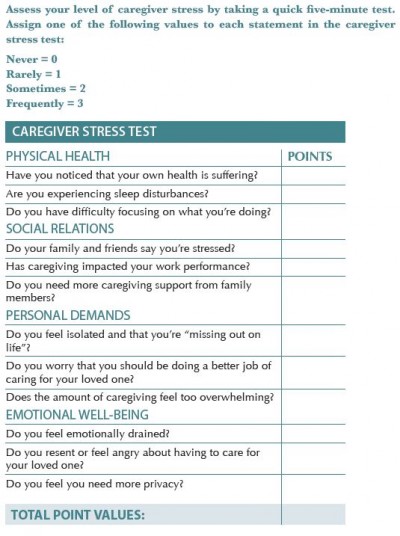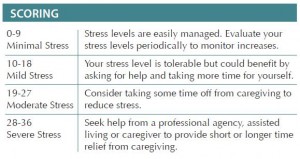Featured Articles
Test Your Level of Caregiver Stress
The weight of being a caregiver, especially for a family member with a chronic illness, can affect our health and well-being.
by Eve M. Stern, RN, MS
For Banford Senior Community soniaf@banfordliving.com
Caregiving has become a more commonly recognized and talked-about term in the last few years with an estimated 69 million unpaid caregivers, comprising 29 percent of the U.S. adult population. Almost 49 million of these unpaid caregivers are caring for adults only, while 12.9 million care for both children and adults. Each year, more and more baby boomers are faced with the burdens of caregiving for their parents, just when they finish raising their children. With the social trend of family members no longer living in the same city, long distance caregiving creates an additional set of complex challenges for the individual trying to routinely assess the loved one’s needs and coordinating the necessary support for them.
Many of us don’t self-identify as caregivers, yet we continuously provide unconditional care as part of our commitments or social obligations to the key relationships in our lives. However, the weight of being a caregiver, especially for a family member with a chronic illness, can affect our health and well-being. A recent AARP/MetLife study on caregiving in the U.S. reported that the typical caregiver averages 21.9 hours per week of caregiving activities for an average duration of 4.6 years.1 The ability to sustain this effort on top of a paying job is bound to affect work productivity and absenteeism, which only compounds the stress of care giving.
Caregiver stress levels can be easily overlooked and, if not addressed, can lead to depression, fatigue, sleep deprivation, social isolation, poor nutrition, and even reduction of the caregiver’s lifespan by as much as 10 years.2 Overlay this with the financial impact of caregiving, and you have a recipe for suboptimal health.
Additional Action Steps
1. Learn about the condition of the person you are caring for. Chronic illnesses have stages of progression that require different care giving skills and capabilities.
2. Know what resources are available to help you. For example, home care, adult day services, and other respite programs can provide relief to offer a break from caregiving. Many assisted living communities will also accommodate short stays.
3. Get connected. Caregivers often feel socially isolated. Learn to ask for help from family and friends. Seek out support groups to find comfort from others in similar situations. Use the Internet to find others who can share their personal experiences and provide insights on dealing with caregiver challenges.
4. Remember to take care of yourself. If you exhaust yourself or get sick, you won’t be able to assist your loved one, which can trigger feelings of guilt. It’s hard to find a daily balance, but each day, try to make it a priority to eat healthy foods, take time out for yourself, and get a decent night’s sleep: all basic essentials for your own physical and mental well-being.
Foot Notes:
1. National Alliance for Caregiving in collaboration with AARP. Caregiving in the U.S. (November 2009).
2. Epel, E.S. et al. University of California, San Francisco. From the proceedings of the National Academy of Sciences, December 7, 2004, Vol. 101, No. 49.




